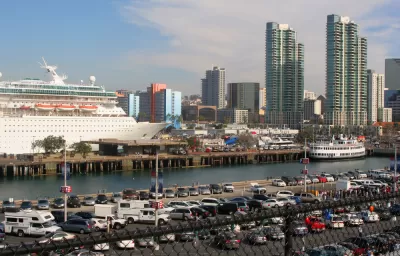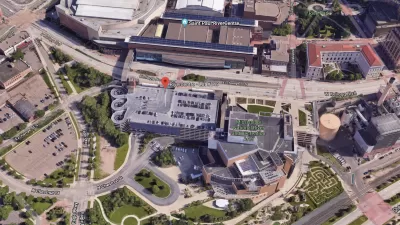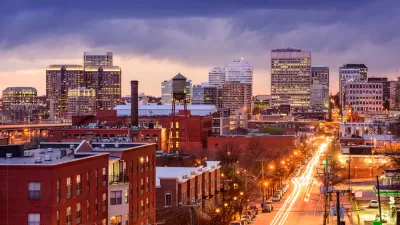A proposed code amendment would expand parking reforms implemented by San Diego in 2019.

Almost exactly two years after San Diego voted to eliminate parking requirements for new multi-family residential developments in designated Transit Priority Areas around the city, a new proposal would expand parking reform to "non-residential land uses" in those same areas.
An article by Dan Griffin provides the only existing local news coverage of the proposed change, which appeared before the city Planning Commission on June 3 and is expected for a City Council vote in July. Griffin's article mostly shares the viewpoints of local business owners about perceptions of an existing lack of parking near their neighborhoods, although one restaurant owner is quoted saying that the city's outdoor dining program allowed their café to stay in operation during the pandemic.
According to the item prepared for the Planning Commission, the parking policy reform code amendment "is complimentary to other City initiatives, such as Complete Communities and the Climate Action Plan, and is aimed at reducing dependency on single occupancy vehicle use and greenhouse gas emissions and supporting investments in transit and active transportation."
San Diego is once again carrying the banner for parking reform, but the number of cities also pursuing parking reforms is increasing almost weekly. Just in the past couple of weeks, Richmond, Virginia and Raleigh, North Carolina also took steps toward eliminating parking requirements.
FULL STORY: San Diego Considers Eliminating Parking Space Requirements to Save Businesses Money, Reduce Pollution

Planetizen Federal Action Tracker
A weekly monitor of how Trump’s orders and actions are impacting planners and planning in America.

San Francisco's School District Spent $105M To Build Affordable Housing for Teachers — And That's Just the Beginning
SFUSD joins a growing list of school districts using their land holdings to address housing affordability challenges faced by their own employees.

The Tiny, Adorable $7,000 Car Turning Japan Onto EVs
The single seat Mibot charges from a regular plug as quickly as an iPad, and is about half the price of an average EV.

As Trump Phases Out FEMA, Is It Time to Flee the Floodplains?
With less federal funding available for disaster relief efforts, the need to relocate at-risk communities is more urgent than ever.

With Protected Lanes, 460% More People Commute by Bike
For those needing more ammo, more data proving what we already knew is here.

In More Metros Than You’d Think, Suburbs are Now More Expensive Than the City
If you're moving to the burbs to save on square footage, data shows you should think again.
Urban Design for Planners 1: Software Tools
This six-course series explores essential urban design concepts using open source software and equips planners with the tools they need to participate fully in the urban design process.
Planning for Universal Design
Learn the tools for implementing Universal Design in planning regulations.
Smith Gee Studio
City of Charlotte
City of Camden Redevelopment Agency
City of Astoria
Transportation Research & Education Center (TREC) at Portland State University
US High Speed Rail Association
City of Camden Redevelopment Agency
Municipality of Princeton (NJ)





























